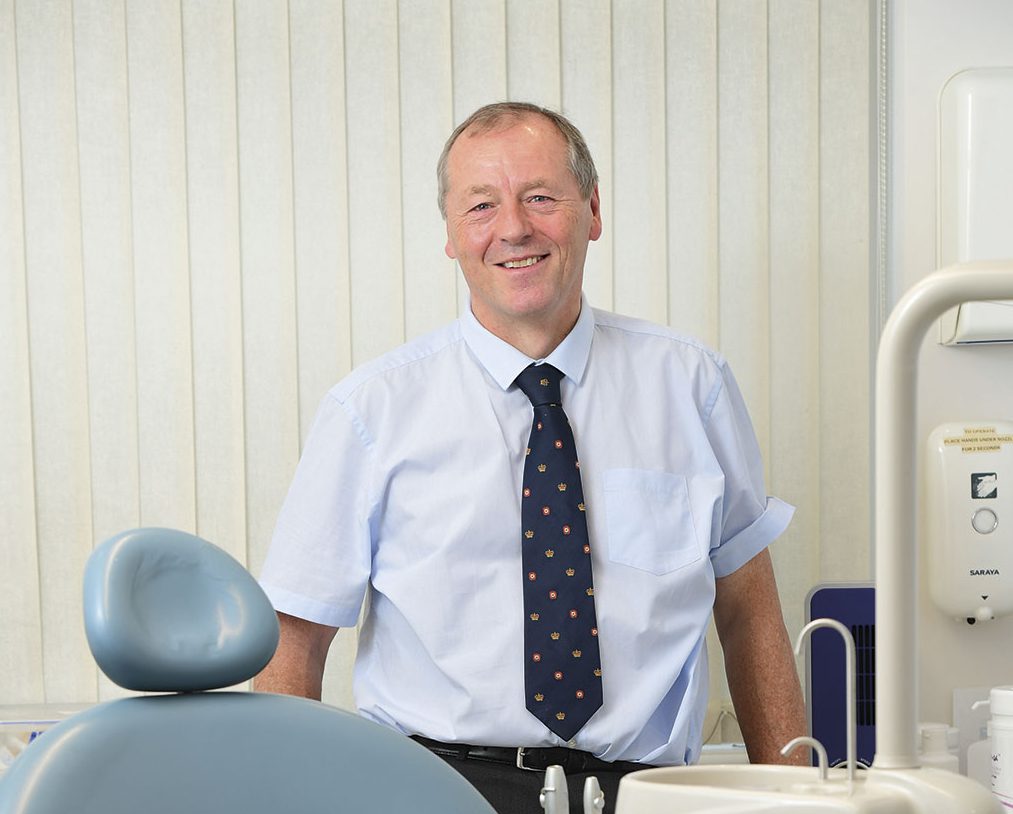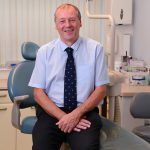McDonald’s out to deliver
In October last year, Fraser McDonald became Dean of the Dental Faculty at the Royal College of Surgeons of Edinburgh
It might seem strange that a born-and-bred Midlander, who has always been based in the south, has taken over this role, but his name betrays his Scottish roots (Fraser’s father was from Paisley) and he has links with the College that date back over 30 years.
He has a great appreciation of the College’s unique character, and a simple aim – “to get the next generation motivated to engage with the College”.
As well as the College’s promotion of rigorous professional standards, he wants younger people to consider its ability to help them to gain a holistic view of the profession, and relish their place in it.
“i’m keen to put in place a structure to encourage people to work with the College and show monetary reward is not everything”
Fraser McDonald
“Many young people see the Royal Colleges as an old boy network or believe they have no value. Similarly, the number of people applying to work as volunteers at the College is reducing,” he said.
“I’m keen to put in place a structure to encourage people to work with the College and show them that monetary reward is not everything. Enjoying your job is equally, if not more, important.
“Our diploma ceremonies have a certain pomp and circumstance, and provide spectacle, but they also give people the chance to reflect on the hard work that has gone into gaining a qualification.”
He believes Edinburgh stands out in several ways, not least with its outward- looking ethos. “We try to engage with the whole world, and standardise things across the globe. That means that as people move between countries, assuming they’ve taken one of our exams, we can be sure about their level of competency.”
And he said people in Scotland are extremely polite. “I cycle frequently and in some other work environments when I’ve turned up in cycling gear I’ve been told to go round the back for deliveries! If you turn up at Edinburgh College in biking clothes they say ‘Good morning, sir. Did you have a good cycle?’’
Give it a try
The fact that Fraser ended up with a career in dentistry was more providential than carefully planned. He explained: “My generation didn’t have the work experience opportunities that young people get these days. It was very much a case of looking for role models and I remember my parents saying that our neighbours’ son was a dentist and seemed to be enjoying himself – they suggested I give it a try, and that was it.”
Qualifying at Birmingham in 1980, he joined with fellow graduates in seeking a house officer post. “I remember selecting from three very good on-call hospitals and ending up as a house officer at Worcester.”
Back then, he noted, the generally accepted idea was that “you’d learn how to take out wisdom teeth and then settle into practice”. Sure enough, after 12 months of duty in Worcester hospital he went into practice in Cheltenham.
Within six weeks he’d realised it wasn’t the right decision for him. “I’ve every respect for practitioners who spend 40 years in practice, but it wasn’t something I could see myself doing.”
His next move saw him come into contact with the Edinburgh College for the first time. “To get back into a hospital post I had to sit the primary FDS exam and did so at Edinburgh.”
Subsequently, he took up a position at Basingstoke Hospital where a consultant encouraged him to try for a training post in orthodontics taking place at the Royal Dental School in Leicester Square. It was, in fact, the last course to run before the School closed soon after and the start of his career-long specialisation.
Soon after starting to practice orthodontics, Fraser was asked by his then boss, Professor William Houston who also had links with Edinburgh, if he was interested in academia. He took his first steps and before long was teaching physiology and orthodontics at Guy’s – then known as the United Medical and Dental Schools of Guy’s and St Thomas’s incorporating the Royal Dental School,
or UMDS for short.
The links with Edinburgh College were strengthened when Professor Murray Meikle became Fraser’s new head of department at UMDS. “He took me under his wing, gave me new responsibilities and encouraged my ties with Edinburgh – he had a long association with the College and in becoming dean of the dental faculty I’ve followed in his footsteps.”
When Murray retired, Fraser took over as head of department at King’s College London, formerly UMDS, which was subsequently taken over by King’s College London.
Perspectives
His wide-ranging experience has given him specific perspectives.
“Unfortunately, universities now see students as customers. They bring in cash and few universities have the capacity or framework to remove a student from a course if he or she doesn’t want to go.”
Meantime, he argued, modern trends in higher education can militate against requirements in dentistry. “For example, dental students need to be taught essential information on radiation and radiographs – it’s a must if you want to get on the register. However, mandatory attendance at university lectures seems increasingly rare. If you suggest to the university that they take a register of attendees at dentistry lectures in order to meet regulatory obligations, they get very upset. I find that baffling.”
According to Fraser, the Royal Colleges, which were originally established to help develop post-graduate education qualifications for those in the medical and dental fields, remain crucially independent arbitrators.
“They emphasise quality and maintain standards by giving great opportunities for progression. They do so in a way that’s inclusive and welcoming. The pro bono work they are involved in setting up gives those involved a great sense of satisfaction.”
Professional approach
He is very keen to promote the sense of professionalism in the sector, believing that these days it’s much more difficult for professionals to gain respect from the public.
“Many politicians aren’t professional – they’ve been caught making inappropriate expenses claims. People are starting to question the whole need to act professionally, which is sad and worrying.
“People have access to all sorts of information online, some of that reliable, but a lot of it unreliable. As a consequence there are some ambulance- chasing organisations who provoke patients into pursuing claims against dentists that are often without merit.
“As a result we now have to make sure we lecture students on professionalism and its implications.”
On a similar theme, he noted the GDC’s recent review of the area of fitness to practice. “Unfortunately, the existing available data is very much a blunt tool for finding solutions and taking things forward. It would be good if we could find a way of using data collected by bodies such as the Medical Defence Union and the Medical Protection Society.”
Fraser believes they are sitting on very valuable information and, so long as it was accessed in a way that maintains confidentiality and doesn’t lead to finger pointing, it could help shape teaching to address any problems that exist. “However, I fully recognise the sensitivities around this area and the reluctance of organisations to release carefully guarded data.”
Deficit to surplus
His progress to dean comes on the back of some notable administrative successes at Edinburgh College. “Among other things, I became chair of the orthodontic board in 2012. At the time we had a lot of diets in a lot of countries and it was costing the College quite a bit of money.
“On looking at the set-up it was clear to me that there were many areas where we were good and others where we were inconsistent and could tighten up. With a few simple changes it was possible to turn a deficit into a surplus.”
As board chair he was keen to reduce the travel undertaken by international candidates by delivering exams online. “We had some very good exam team members and helped them develop their skills in areas such as question setting and modern assessment techniques.
“While I was doing that it became clear that other specialties were looking for the same thing. I thought the post that would allow me to help would be exams convener. Therefore, I took that on and we are now applying the principles developed in orthodontics to those other areas.”
Now, he has taken on the role of dean to help the faculty move ahead, and he’s sure he’ll get the required support. “In other places when you want to take things forward it seems there is always someone ready to tell you it can’t be done, but at Edinburgh they say, ‘Well, we might not be able to do something right away, but we can pursue this option and work out a different way to get to the end goal’.
Since assuming the post, Fraser says his feelings have swung from nervous to excited. He said: “Some days I think ‘Oh my word, what have I walked into?’ However, on others I think ‘Let’s see what we can do here and make changes that will benefit the patients, the College and everyone concerned.’
“Luckily, the latter thoughts tend to appear more often than the former.”
Positive bearer of bad news
Unusually, Fraser McDonald embraces the necessity to break bad news on exams to students. That might seem counter intuitive but he sees it as an opportunity. “If you deliver bad news in a way that gives the individual concerned the chance to
turn things around you can help someone who’s struggling become a competent person who thinks independently. That is very rewarding.
“At Edinburgh College I had the role of exams convener and it was very rewarding to give feedback to people who had failed an exam, but do it in such a way that they could put in place the appropriate revision structure and to succeed in the exam the next time they sat it.”
Fraser’s attitude goes back to an early experience with Edinburgh. He failed the primary FDS exam at first time of asking. However, the College wasn’t nasty or belittling. “Instead, they broke the news in a very constructive way,” he said, “and I had the chance to go back and be successful second time around.”




Comments are closed here.